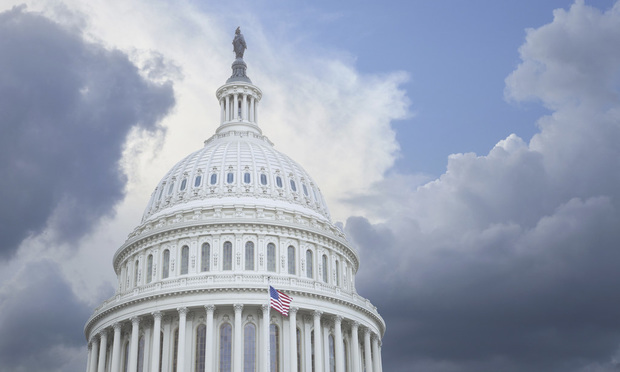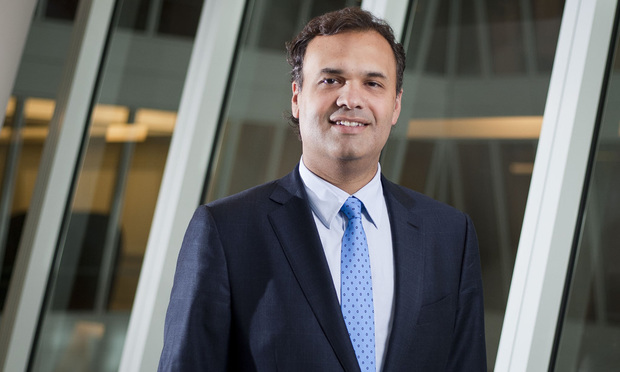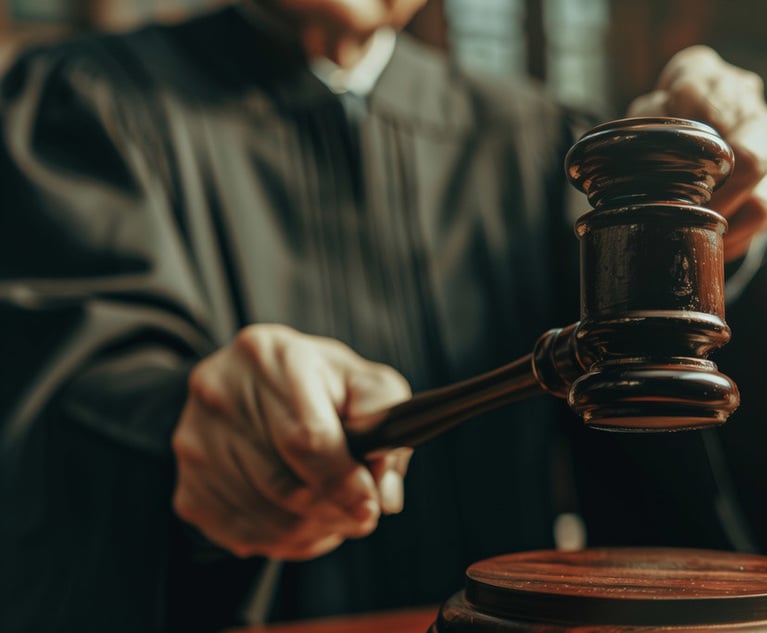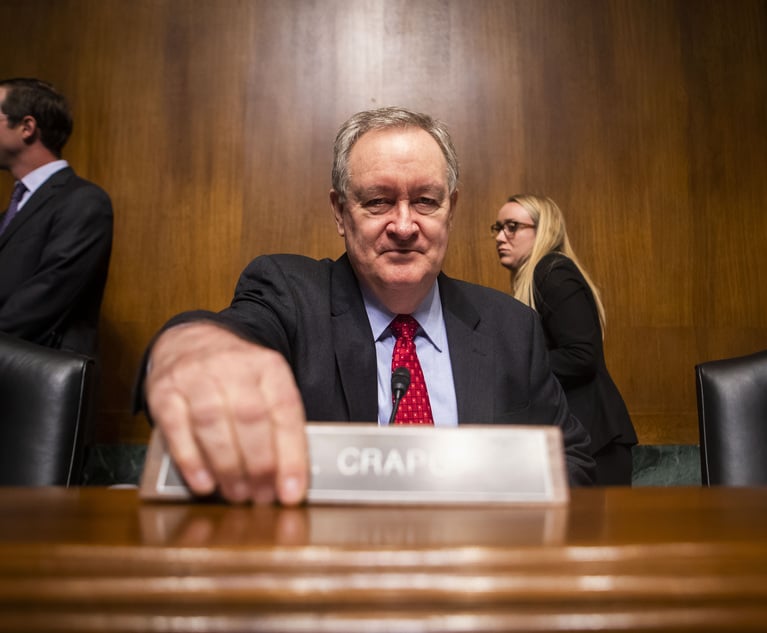'Who Is Bill Burck?' Not the Only Big Law Attorney Reviewing Kavanaugh Documents
Quinn Emanuel's Bill Burck was oft-mentioned at Kavanaugh's confirmation hearing Tuesday. His document-review team includes lawyers from Kirkland & Ellis and Baker Botts.
September 04, 2018 at 02:43 PM
6 minute read
 U.S. Capitol building
U.S. Capitol building
Brett Kavanaugh's confirmation hearing began Tuesday with bitter dialogue among members of the Senate Judiciary Committee, as Democrats protested they had been denied access to tens of thousands of pages pertinent to their review of President Donald Trump's nominee to replace Justice Anthony Kennedy on the Supreme Court.
Amid the pandemonium came a question from Sen. Dick Durbin, one of the committee's senior-most Democratic members: “Who is Bill Burck?”
“By what authority can he restrict the information given to the Senate Judiciary Committee and the American people? Is he a government employee? No one knew this mysterious Bill Burck, who is filtering these documents,” Durbin said, recalling questions he asked of Kavanaugh during their meeting.
The events of 2018 have made Burck, a partner at Quinn Emanuel Urquhart & Sullivan, even more of a known quantity. Burck has been working with dozens of lawyers to review those records and transmit them to the Senate Judiciary Committee. Some of those documents have been made public. Others, not so. Burck's team of lawyers, working for former President George W. Bush, designated some of the records “committee confidential.”
Burck, co-managing partner of Quinn Emanuel's Washington office, is also representing White House counsel Donald McGahn along with at least a half dozen other current or former Trump aides in their dealings with the special counsel investigating Russian interference in the 2016 election. His name came up repeatedly Tuesday at Kavanaugh's confirmation hearing, which is expected to last through the week. Democrats urged the Republicans to pause the proceeding to allow the full scope of records to be reviewed and released. “All of these documents will come out,” Sen. Richard Blumenthal, D-Connecticut, vowed.
Republicans resisted Democrats' claims that they were being left in the dark about the full scope of Kavanaugh's work at the Bush White House, where he served as a counsel and staff secretary, the gatekeeper for information that reaches the president.
“No White House would allow every piece of paper that went to and from the president to be made public,” Sen. Ted Cruz, R-Texas, said. He called the documents “utterly irrelevant” to what Kavanaugh thinks or believes, and would only lead to a “fishing expedition” and an attempt to “distract and delay.”
Judiciary Chairman Sen. Charles Grassley, R-Iowa, said the document review of Bush's records complied with the Presidential Records Act, which gives former presidents the chance to review records before they are released. “The National Archives was not cut out of the process,” Grassley said.
Burck did not work alone in the document review process. His team included two Texas-based attorneys: Kirkland & Ellis partner Brigham Cannon and Evan Young, an Austin-based partner at Baker Botts. Cannon and Young did not immediately respond to requests for comment.
“I get the interest in my popping up in some of the big issues of the day,” Burck told the New York Times in a recent profile. “But it's a mistake to believe lawyers are interesting because their clients are.”
 William Burck of Quinn Emanuel. Credit: Diego M. Radzinsci / NLJ
William Burck of Quinn Emanuel. Credit: Diego M. Radzinsci / NLJCannon joined Kirkland & Ellis in 2011 following a four-year stint at the U.S. Justice Department, where he was a trial attorney in the criminal division's fraud section. He was recognized for helping the investigation and prosecution of Lee Bentley Farkas, the former chairman of the private mortgage company Taylor, Bean & Whitaker, who was found guilty of orchestrating a nearly $3 billion fraud that contributed to the failure of Colonial Bank.
As a partner in Kirkland & Ellis' Houston office, Cannon has represented clients in investigations into violations of the Foreign Corrupt Practices Act, along with health care and securities fraud. In 2016, he represented the generic drug giant Teva Pharmaceuticals Industries Inc. in a $520 million settlement with the Justice Department and U.S. Securities and Exchange Commission resolving allegations that the company and its Russian subsidiary paid millions of dollars in bribes to government officials in Russia, Ukraine and Mexico.
Cannon last donated to a political campaign in 2012, when he contributed $350 to former Massachusetts Gov. Mitt Romney's presidential bid. He donated an additional $250 that year to a political action committee supporting Romney, who is now the Republican nominee to replace retiring U.S. Sen. Orrin Hatch, R-Utah.
Young is a former clerk for the late Justice Antonin Scalia who has argued before the U.S. Supreme Court. Following his clerkship, Young served from 2006 to 2008 as counsel to Attorneys General Alberto Gonzales and Michael Mukasey.
Outside the Austin office of Baker Botts, where he is chairman of the litigation department, Young teaches at the University of Texas School of Law. He has taught “Federal Courts” since 2015, according to the school's website.
Earlier this year, Young filed an amicus brief urging the Supreme Court to consider the deference courts give government agencies in enacting federal laws and regulations. Filed on behalf of trade groups, the brief asked the high court to “reevaluate the legitimacy of this doctrine” of deference, saying it had enable the “erosion of the judiciary's role in assessing executive assertions of authority.”
Young has also involved himself in Texas politics. In May, he contributed $1,000 to the re-election campaign of U.S. Rep. John Carter, a Republican who represents the northern suburbs of Austin. Federal election disclosures show that Young has also donated in recent years to the campaigns of three other Texas Republicans: U.S. Reps. Michael McCaul, Bill Flores and Roger Williams.
Young is married to Tobi Young, a clerk to Justice Neil Gorsuch. Before her clerkship, Tobi Young was counsel to the George W. Bush Presidential Library Center. Young formerly was the designated Presidential Records Act representative for Bush.
Read more:
Gorsuch Hires Native American Law Clerk, Likely First in SCOTUS History
Bannon, Priebus, McGahn: Bill Burck's White House Client Juggle
Protests, Complaints Mar Start of Kavanaugh's SCOTUS Hearing
New Book Tells Inside Stories of Feuding Justices, Anger Toward Trump
This content has been archived. It is available through our partners, LexisNexis® and Bloomberg Law.
To view this content, please continue to their sites.
Not a Lexis Subscriber?
Subscribe Now
Not a Bloomberg Law Subscriber?
Subscribe Now
NOT FOR REPRINT
© 2025 ALM Global, LLC, All Rights Reserved. Request academic re-use from www.copyright.com. All other uses, submit a request to [email protected]. For more information visit Asset & Logo Licensing.
You Might Like
View All
Who Are the Judges Assigned to Challenges to Trump’s Birthright Citizenship Order?

Senator Plans to Reintroduce Bill to Split 9th Circuit

'If the Job Is Better, You Get Better': Chief District Judge Discusses Overcoming Negative Perceptions

Fight Over Amicus-Funding Disclosure Surfaces in Google Play Appeal
Trending Stories
- 1Decision of the Day: Trial Court's Sidestep of 'Batson' Deprived Defendant of Challenge to Jury Discrimination
- 2Is Your Law Firm Growing Fast Enough? Scale, Consolidation and Competition
- 3Child Custody: The Dangers of 'Rules of Thumb'
- 4The Spectacle of Rudy Giuliani Returns to the SDNY
- 5Orrick Hires Longtime Weil Partner as New Head of Antitrust Litigation
Who Got The Work
J. Brugh Lower of Gibbons has entered an appearance for industrial equipment supplier Devco Corporation in a pending trademark infringement lawsuit. The suit, accusing the defendant of selling knock-off Graco products, was filed Dec. 18 in New Jersey District Court by Rivkin Radler on behalf of Graco Inc. and Graco Minnesota. The case, assigned to U.S. District Judge Zahid N. Quraishi, is 3:24-cv-11294, Graco Inc. et al v. Devco Corporation.
Who Got The Work
Rebecca Maller-Stein and Kent A. Yalowitz of Arnold & Porter Kaye Scholer have entered their appearances for Hanaco Venture Capital and its executives, Lior Prosor and David Frankel, in a pending securities lawsuit. The action, filed on Dec. 24 in New York Southern District Court by Zell, Aron & Co. on behalf of Goldeneye Advisors, accuses the defendants of negligently and fraudulently managing the plaintiff's $1 million investment. The case, assigned to U.S. District Judge Vernon S. Broderick, is 1:24-cv-09918, Goldeneye Advisors, LLC v. Hanaco Venture Capital, Ltd. et al.
Who Got The Work
Attorneys from A&O Shearman has stepped in as defense counsel for Toronto-Dominion Bank and other defendants in a pending securities class action. The suit, filed Dec. 11 in New York Southern District Court by Bleichmar Fonti & Auld, accuses the defendants of concealing the bank's 'pervasive' deficiencies in regards to its compliance with the Bank Secrecy Act and the quality of its anti-money laundering controls. The case, assigned to U.S. District Judge Arun Subramanian, is 1:24-cv-09445, Gonzalez v. The Toronto-Dominion Bank et al.
Who Got The Work
Crown Castle International, a Pennsylvania company providing shared communications infrastructure, has turned to Luke D. Wolf of Gordon Rees Scully Mansukhani to fend off a pending breach-of-contract lawsuit. The court action, filed Nov. 25 in Michigan Eastern District Court by Hooper Hathaway PC on behalf of The Town Residences LLC, accuses Crown Castle of failing to transfer approximately $30,000 in utility payments from T-Mobile in breach of a roof-top lease and assignment agreement. The case, assigned to U.S. District Judge Susan K. Declercq, is 2:24-cv-13131, The Town Residences LLC v. T-Mobile US, Inc. et al.
Who Got The Work
Wilfred P. Coronato and Daniel M. Schwartz of McCarter & English have stepped in as defense counsel to Electrolux Home Products Inc. in a pending product liability lawsuit. The court action, filed Nov. 26 in New York Eastern District Court by Poulos Lopiccolo PC and Nagel Rice LLP on behalf of David Stern, alleges that the defendant's refrigerators’ drawers and shelving repeatedly break and fall apart within months after purchase. The case, assigned to U.S. District Judge Joan M. Azrack, is 2:24-cv-08204, Stern v. Electrolux Home Products, Inc.
Featured Firms
Law Offices of Gary Martin Hays & Associates, P.C.
(470) 294-1674
Law Offices of Mark E. Salomone
(857) 444-6468
Smith & Hassler
(713) 739-1250








